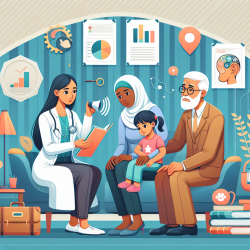In the field of audiology, informational counseling is a critical component of the support provided to families following the diagnosis of permanent childhood hearing loss. Recent research, such as the study titled "Parental views on informational counseling provided by audiologists for children with permanent childhood hearing loss," highlights the importance of improving the quality and comprehensiveness of this counseling. The study's findings offer valuable insights that practitioners can use to enhance their counseling practices, ensuring better outcomes for children and their families.
Key Findings from the Research
The study conducted in KwaZulu-Natal, South Africa, involved 97 face-to-face semi-structured interviews with parents and primary caregivers of children diagnosed with hearing loss. The results revealed several critical gaps in the informational counseling provided by audiologists:
- Many parents reported receiving biased information that favored certain communication options and school choices.
- There was a significant lack of information on aural rehabilitation and family-centered intervention.
- Parents identified the need for more comprehensive information on all available communication options, educational methodologies, and rehabilitative technologies.
- Socio-economic status, cultural beliefs, and language barriers were not adequately considered during counseling sessions.
Practical Recommendations for Audiologists
Based on these findings, audiologists can take several steps to improve their informational counseling practices:
- Provide Balanced Information: Ensure that parents receive unbiased and comprehensive information about all available communication options, educational methodologies, and rehabilitative technologies. This enables parents to make informed decisions that best suit their child's needs.
- Consider Cultural and Socio-Economic Factors: Tailor counseling sessions to account for the family's cultural beliefs, spiritual practices, and socio-economic status. This approach helps build trust and ensures that the information is relevant and accessible.
- Enhance Communication: Use clear, concise language and consider the family's preferred language during counseling. Providing information in the family's first language can significantly improve understanding and retention.
- Include Parent Support Groups: Facilitate connections with parent-to-parent support groups. These groups offer emotional support and practical advice from other parents who have navigated similar challenges.
- Emphasize Aural Rehabilitation: Highlight the importance of aural rehabilitation and family-centered intervention. Explain the benefits and provide concrete steps for parents to follow, ensuring they understand the long-term impact on their child's development.
Encouraging Further Research
While the study provides valuable insights, it also underscores the need for ongoing research to continually refine and improve informational counseling practices. Audiologists are encouraged to engage in further research, particularly in diverse socio-cultural contexts, to better understand the unique needs of families and how best to support them.
To read the original research paper, please follow this link: Parental views on informational counseling provided by audiologists for children with permanent childhood hearing loss.










